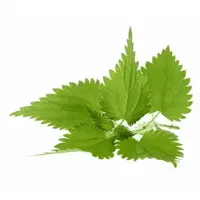Nettle

Although this green plant differs in its obstinate character, it carries great value for humans. Nettles have long been used not only for medicinal purposes (in cosmetology and medicine), but also for culinary purposes. Chefs have learned to cook from the greens of this rather specific plant not only aromatic and very tasty first courses, such as soups, cabbage soup and borscht, but also use nettles as the most delicate filling for pies and other types of baking.
In addition, salads and sauces are often prepared from it, which, thanks to the bright color of the nettle leaves, acquire a rich color of fresh greens. For culinary purposes, it is used not only in fresh or dried form, but also, interestingly, with sauerkraut. By the way, often young inflorescences of this plant are brewed and consumed as tea, which has a beneficial effect on the state of the body due to a considerable number of beneficial properties of nettles.
Nettle composition
The healing qualities of this green plant are due to the composition of nettles, which includes carbohydrates, fiber, proteins, organic acids and ash. But still, most of this plant is water, which is approximately 90 percent. The vitamin composition of nettles is diverse: it contains vitamins A, A (RE), PP, V1 and V
2. In addition, the following minerals are also present in this plant: calcium, magnesium, potassium, sodium, iodine, phosphorus and iron.
Benefits of nettle
The benefits of nettles as an anti-inflammatory, hemostatic and hypoglycemic agent are known. With its help, it is recommended to increase the tone of the uterine cavity, as well as the number of red blood cells in the blood and the level of hemoglobin. Therefore, nettles are often recommended for the treatment of bleeding, low blood, tuberculosis, kidney disease, liver disease, bladder and metabolic disorders.
Traditional medicine claims the benefits of nettles as an indispensable medicine, on the basis of which various drugs are made that have strengthening, wound-healing, laxative, diuretic, anticonvulsant and antioxidant properties. Its regular consumption contributes to the speedy healing of wounds and small ulcers, and from crushed dried nettle leaves it is recommended to make infusions, lotions and baths, which, with regular use, prevent hair loss and contribute to their speedy growth and healthy shine.
Harms of nettle
As useful as this plant is, harm to nettles is also possible in some cases. In particular, it is forbidden to eat it, as well as to use nettle-based drugs during pregnancy and in the presence of a disease such as thrombophlebitis.
nettle 24.8 kCal
Energy value of nettles (Ratio of proteins, fats, carbohydrates - ju):
Proteins: 1.5 g (~ 6 kCal)
Fats: 0 g (~ 0 kCal)
Carbohydrates: 5g (~ 20kCal)
Energy ratio (bj | y): 24% | 0% | 81%
 Español
Español Français
Français Português
Português Русский
Русский 简体中文
简体中文 繁體中文
繁體中文 日本語
日本語 한국어
한국어 العربية
العربية Türkçe
Türkçe Қазақ
Қазақ Deutsch
Deutsch Italiano
Italiano Українська
Українська
